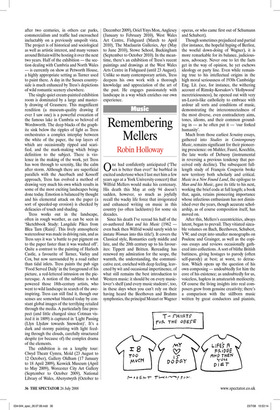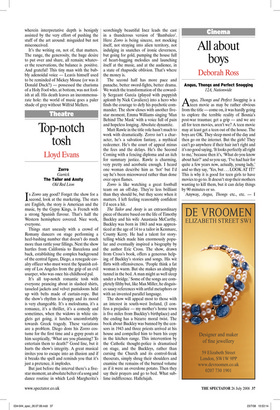Remembering Mellers
Robin Holloway
One had confidently anticipated (‘The sex is better than ever!’ he burbled in excited undertone when I last met him a few years ago at a York University concert) that Wilfrid Mellers would make his centenary. His death this May at only 94 doesn’t sadden, however, so much as joyfully recall the wacky life force that invigorated and enhanced writing on music in this country (so often lacklustre) for some six decades.
Since his death I’ve reread his half of the co-authored Man and his Music (1962 — even back then Wilfrid would surely wish to instate Woman into this title!). It covers the Classical style, Romantics early middle and late, and the 20th century up to his favourites: Tippett and Britten. Rereading has renewed my admiration for the scope, the warmth, the understanding, the communicative zest, enriched with deep feeling, leavened by wit and occasional impertinence, of what still remains the best introduction to Western music: it should be on every musiclover’s shelf (and every music students’, too, in these days when you can’t rely on their having heard the Beethoven and Brahms symphonies, the principal Mozart or Wagner operas, or who came first out of Schumann and Schubert).
Though sometimes prejudiced and partial (for instance, the hopeful hyping of Berlioz, the woeful down-doing of Wagner), it is more remarkable for its balance, judiciousness, advocacy. Never one to let the facts get in the way of opinion, he yet eschews ideology or party line. Even while remaining true to his intellectual origins in the high moral seriousness of 1930s Cambridge Eng. Lit. (see, for instance, the withering account of Rimsky-Korsakov’s ‘Hollywood’ meretriciousness), he opened out with very un-Leavis-like catholicity to embrace with ardour all sorts and conditions of music, demonstrating the interconnectedness of the most diverse, even contradictory aims, tones, idioms, and their common grounding in — as he often put it — ‘our forked humanity’.
Much from those earliest Scrutiny essays, gathered into Studies in Contemporary Music, remains significant for their pioneering prescience: on Mahler, Fauré, Koechlin, the late works of Debussy (instrumental in reversing a previous tendency that perceived only decline). The subsequent fulllength study of François Couperin broke new territory both scholarly and critical. Music in a New Found Land, the epilogue to Man and his Music, gave its title to his next, working the brief coda at full length; a book that, again, retains pioneering importance whose infectious enthusiasm has not diminished over the years, though accurate scholarship, as of course composition itself, has moved on.
After this, Mellers’s eccentricities, always latent, began to prevail. They vitiated sizeable volumes on Bach, Beethoven, Schubert, VW; and crept into smaller monographs on Poulenc and Grainger, as well as the copious essays and reviews occasionally gathered into collections. A sort of blithe British battiness, giving hostages to parody (often self-parody) at best; at worst, to detraction. Which opens up the question of his own composing — undoubtedly for him the core of his existence; as undoubtedly for us, voiceless, hapless in amateurish mediocrity. Of course the living insights into real composers grew from genuine creativity; there’s a comparison with the stillborn music written by great conductors and pianists, wherein interpretative depth is benignly assisted by the very effort of pushing the stuff of the art around: misguided but not misconceived.
It’s the writing on, not of, that matters. The range, the generosity, the huge desire to put over and share, all remain; whatever the reservations, the balance is positive. And grateful! This tiny man with the bubbly adenoidal voice — Leavis himself used to be reminded of Mickey Mouse (or was it Donald Duck?) — possessed the charisma of a Holy Fool who, at bottom, was not foolish at all. His death leaves an incommensurate hole: the world of music goes a paler shade of grey without Wilfrid Mellers.



























































 Previous page
Previous page